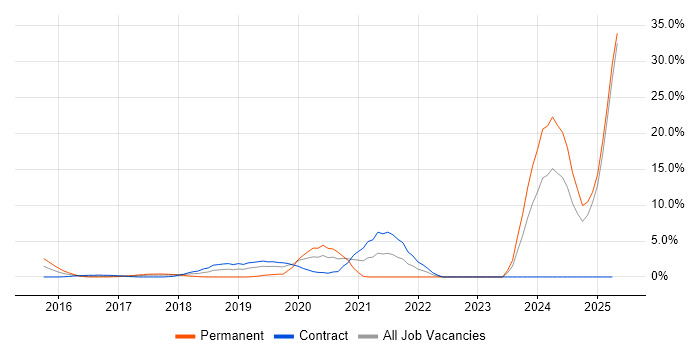Hybrid Cloud
Hampshire > Winchester
The table below looks at the prevalence of the term Hybrid Cloud in permanent job vacancies in Winchester. Included is a benchmarking guide to the salaries offered in vacancies that cited Hybrid Cloud over the 6 months leading up to 29 May 2025, comparing them to the same period in the previous two years.
| 6 months to 29 May 2025 |
Same period 2024 | Same period 2023 | |
|---|---|---|---|
| Rank | 2 | 3 | - |
| Rank change year-on-year | +1 | - | - |
| Permanent jobs citing Hybrid Cloud | 16 | 32 | 0 |
| As % of all permanent jobs advertised in Winchester | 29.63% | 34.04% | - |
| As % of the Miscellaneous category | 55.17% | 69.57% | - |
| Number of salaries quoted | 0 | 3 | 0 |
| Median annual salary (50th Percentile) | - | £56,421 | - |
| Hampshire median annual salary | - | £75,000 | £70,000 |
| % change year-on-year | - | +7.14% | +7.69% |
All Generic Skills
Winchester
Hybrid Cloud falls under the General and Transferable Skills category. For comparison with the information above, the following table provides summary statistics for all permanent job vacancies requiring generic IT skills in Winchester.
| Permanent vacancies with a requirement for generic IT skills | 29 | 46 | 35 |
| As % of all permanent jobs advertised in Winchester | 53.70% | 48.94% | 50.72% |
| Number of salaries quoted | 4 | 13 | 25 |
| 10th Percentile | - | - | £31,650 |
| 25th Percentile | £62,500 | £25,250 | £42,500 |
| Median annual salary (50th Percentile) | £65,000 | £28,500 | £50,000 |
| Median % change year-on-year | +128.07% | -43.00% | -9.09% |
| 75th Percentile | £67,500 | £35,911 | £52,500 |
| 90th Percentile | - | £58,027 | £69,500 |
| Hampshire median annual salary | £55,000 | £50,000 | £54,000 |
| % change year-on-year | +10.00% | -7.41% | -1.82% |
Hybrid Cloud
Job Vacancy Trend in Winchester
Job postings citing Hybrid Cloud as a proportion of all IT jobs advertised in Winchester.

Hybrid Cloud
Salary Trend in Winchester
3-month moving average salary quoted in jobs citing Hybrid Cloud in Winchester.
Hybrid Cloud
Co-occurring Skills and Capabilities in Winchester by Category
The follow tables expand on the table above by listing co-occurrences grouped by category. The same employment type, locality and period is covered with up to 20 co-occurrences shown in each of the following categories:
